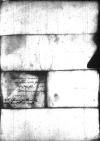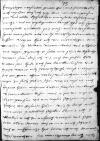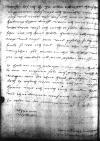Letter #5852
Johann Albrecht of Brandenburg-Ansbach to Ioannes DANTISCUSCologne, 1531-11-02
| received Brussels, 1531-11-05 Manuscript sources:
Auxiliary sources:
| ||||||
Text & apparatus & commentaryPlain textText & commentaryText & apparatus
[Er]wyrdigem meynem [gut]ten hern und freundt
Erwyrdiger wesunder gutter her und freundt.
Las euch wyssen, das ich pey probably
Weyter hab ich von euerntbegen probably
Weyter wyl ich euch gepeten haben, meyner lieben swester den brieff uberantborden lassen. / Und si seer von meynetbegen grussen. / Und mir wyder schreyben, wy al sachen ein gestandt haben. / Und dy brieff auff
Fur neue czeytung las ich euch wyssen, das ich hy zu
Heudt czey ich wyder hy weg und wyl
Hymit thu ich euch wunschen fil gutter nacht und tag und pit euch, welledt all gutt gesellen grussenn. Es hadt an mich gelangt mein bruder, hab al dy rein in meinem sale auf gethan und dy wappen von der thur herab gerischen. / Was doch dy ursach were, wolt ich gern wyssen.
Hymit wyl ich mich euch bevollenn haben und thue damit, was euch lieb ist.
Geben zu
Alzeyt euer wylliger


